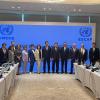News
Displaying Results 1 - 25 of 34
Increasing the use of digital solutions including those developed by the United Nations Centre for Trade Facilitation and Electronic Business (UN/CEFACT) can enhance the sustainability and resilience of supply chains and strengthen global connectivity.
In a series of capacity-building activities…
Four years ago, when the COVID-19 pandemic hit, it disrupted the normal functioning of open markets. The ensuing crisis had crippling effects on global trade and productive capacities: it broke supply chains, reduced connectivity and slowed the flow of essential goods. Global food and energy…
At the World Economic Forum Annual Meeting in Davos, UNECE Executive Secretary Tatiana Molcean highlighted the role of UNECE’s legal instruments, standards and tools in dealing with the most pressing global challenges, namely climate change, digital and green transformations, low-carbon energy…
Trade facilitation is a potent instrument that can multiply the benefits of trade. Beyond direct impact on economic growth through higher trade flows linked to improved efficiency at the borders, trade facilitation reforms can also contribute to other policy goals. For example, through the…
According to a recently published UNECE Policy Paper, the agrifood, the garment and footwear and the mineral sectors contribute significantly to the economic growth and employment in the UNECE region, while being major sources of global greenhouse gases (GHG) and environmental pollution. Evidence…
Strong private sector engagement positively impacts the relevance, legitimacy, and credibility of national trade facilitation bodies (NTFBs) and encourages a business-centric approach to trade facilitation. Over the past several years, governments, donors and international organizations have…
The ongoing repercussions of the COVID-19 pandemic, geopolitical instability, and elevated inflation rates continue to pose challenges to global trade, with the World Trade Organization (WTO)'s trade growth forecast now estimated at only 0.8% this year.
As the global trade landscape grapples…
In today's data-driven world, organizations face the challenge of efficiently integrating and making sense of vast amounts of diverse data. Semantics and semantic interoperability provide a solution by enabling the meaningful interpretation and integration of data across heterogeneous systems. To…
As one of the United Nations regional economic commissions, UNECE has a key role to play in helping countries with economies in transition to better integrate into the global economy. UNECE is at the forefront of setting international standards on cross-border procedures, identifying regulatory and…
The Norwegian Government has issued a Mineral Strategy which necessitates the Geological Survey of Norway to produce an inventory aligned with the United Nations Framework Classification for Resources (UNFC).
UNFC will be crucial in this strategy as it will be used to classify mineral resources…
As the global economy emerges from the COVID-19 pandemic and governments strengthen efforts to “build-back-better”, trade as an engine of growth has re-emerged in policy agendas. For developing countries and countries with economies in transition that are still in the process of accession to the…
In light of today’s triple planetary crisis, one challenge for governments is to ensure that growth goes hand in hand with the development of green, inclusive and prosperous societies. This is even more challenging in today’s rapidly evolving global economy, which requires agile, flexible economies…
In the world grappling with the triple crisis, encompassing the COVID-19 pandemic, ongoing regional conflicts, and climate change, disruptions of global supply chains are becoming more evident, resulting in the global trade slowdown. More specifically, these challenges have led to a significant…
In a move towards sustainable resource management, several countries have presented case studies of how the United Nations Framework Classification for Resources (UNFC) can scale-up harmonized resource management. UNFC provides a common language and standards for the classification of all energy…
Adopted in 1963, the UNECE Standard S-1 concerning the certification and commercial quality control of seed potatoes provides a framework for the international trade of seed potatoes. It is currently the only international standard that ensures that seed potatoes meet specific and harmonized…
The transition from linear to circular economies requires fundamental rethinking of trade policies and regulations. “Harmonized System” codes (HS codes) are a key pillar of the tariff infrastructure for international trade. These HS codes were designed at a time when circular economy considerations…
Technologies can enhance commerce if clear international standards are in place to ensure that their use is harmonized between trading partners, and if there is regulatory coherence among countries.
Ways in which digital and green transformations can improve quality infrastructure for trade in…
The United Nations Framework Classification for Resources (UNFC) is now published in Greek and Portuguese. These translations will support policymakers to implement enhanced sustainable resource management in the UNECE region.
A universally acceptable and internationally applicable scheme for the…
In 2022, international cooperation in energy and critical raw materials is high on the agenda. Optimal use of critical raw materials, for which demand is set to continue rising, will be crucial in delivering the green transition in energy, mobility and the digital world.
This will be in the…
June 2022 has been the month of trade discussions in Geneva, first with the World Trade Organization’s (WTO) 12th Ministerial Conference (MC12) and then UNEC’s Steering Committee on Trade Capacity and Standards (SCTCS). Both looked in detail at responses to the ongoing impact of COVID-19, both…
Minerals such as lithium, cobalt, and copper are essential for digitalization, for renewable energy technologies, and for the further deployment of electric vehicles. Demand for these and other minerals – known as “critical raw materials” (CRMs) – is growing fast as governments and businesses act…
A variety of European and African representatives from business, science, and government presented initiatives to raise awareness of universal sustainable resource management systems at the EU-Africa Business Forum. Experts called for further integration of European and African value chains through…
UNECE led a coalition of international experts to train raw material experts in sustainable resource management.
COP26 added much needed impetus towards climate action. Raw materials will be a pivotal part of the conversation in driving innovation in a regional circular economy including recycling…
If the world is to deliver on climate change and attain the 2030 Agenda for Sustainable Development objectives, we must optimize our endowments of natural resources. A resilient and sustainable supply of natural resources, including critical raw minerals, is essential for sustainable energy,…
The Group of 7 nations (G7), six of which are UNECE member States (Canada, France, Germany, Italy, the UK and the US), took bold step towards reducing barriers to trade by agreeing on the principles to govern cross-border data use and digital trade. At their meeting in London on 22 October,…

























